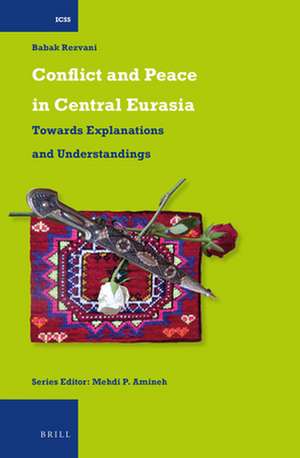Conflict and Peace in Central Eurasia: Towards Explanations and Understandings: International Comparative Social Studies, cartea 31
Autor Babak Rezvanien Limba Engleză Hardback – 18 dec 2014
Din seria International Comparative Social Studies
- 18%
 Preț: 718.31 lei
Preț: 718.31 lei - 18%
 Preț: 888.56 lei
Preț: 888.56 lei - 15%
 Preț: 434.86 lei
Preț: 434.86 lei - 18%
 Preț: 573.49 lei
Preț: 573.49 lei - 18%
 Preț: 618.95 lei
Preț: 618.95 lei - 18%
 Preț: 620.52 lei
Preț: 620.52 lei - 18%
 Preț: 646.01 lei
Preț: 646.01 lei - 18%
 Preț: 686.66 lei
Preț: 686.66 lei - 18%
 Preț: 720.31 lei
Preț: 720.31 lei - 18%
 Preț: 648.86 lei
Preț: 648.86 lei - 18%
 Preț: 645.67 lei
Preț: 645.67 lei - 18%
 Preț: 649.10 lei
Preț: 649.10 lei - 18%
 Preț: 1311.94 lei
Preț: 1311.94 lei - 15%
 Preț: 436.78 lei
Preț: 436.78 lei - 18%
 Preț: 718.38 lei
Preț: 718.38 lei - 18%
 Preț: 685.34 lei
Preț: 685.34 lei - 18%
 Preț: 682.23 lei
Preț: 682.23 lei - 18%
 Preț: 661.82 lei
Preț: 661.82 lei - 18%
 Preț: 667.89 lei
Preț: 667.89 lei - 18%
 Preț: 873.32 lei
Preț: 873.32 lei - 18%
 Preț: 639.52 lei
Preț: 639.52 lei - 18%
 Preț: 904.03 lei
Preț: 904.03 lei - 18%
 Preț: 585.56 lei
Preț: 585.56 lei - 18%
 Preț: 887.76 lei
Preț: 887.76 lei - 15%
 Preț: 438.40 lei
Preț: 438.40 lei - 15%
![Understanding Sarkar [PB]: The Indian Episteme, Macrohistory and Transformative Knowledge](https://i2.books-express.ro/bs/9789004128422/understanding-sarkar-pb.jpg) Preț: 395.71 lei
Preț: 395.71 lei - 18%
 Preț: 841.51 lei
Preț: 841.51 lei - 18%
 Preț: 853.04 lei
Preț: 853.04 lei - 18%
 Preț: 765.88 lei
Preț: 765.88 lei - 18%
 Preț: 964.91 lei
Preț: 964.91 lei - 18%
 Preț: 522.47 lei
Preț: 522.47 lei - 18%
 Preț: 672.70 lei
Preț: 672.70 lei -
 Preț: 391.35 lei
Preț: 391.35 lei - 15%
 Preț: 434.92 lei
Preț: 434.92 lei -
 Preț: 343.11 lei
Preț: 343.11 lei -
 Preț: 318.99 lei
Preț: 318.99 lei -
 Preț: 270.76 lei
Preț: 270.76 lei -
 Preț: 279.07 lei
Preț: 279.07 lei - 15%
 Preț: 394.14 lei
Preț: 394.14 lei -
 Preț: 373.25 lei
Preț: 373.25 lei -
 Preț: 224.50 lei
Preț: 224.50 lei
Preț: 786.42 lei
Preț vechi: 959.05 lei
-18% Nou
Puncte Express: 1180
Preț estimativ în valută:
150.50€ • 163.42$ • 126.42£
150.50€ • 163.42$ • 126.42£
Carte indisponibilă temporar
Doresc să fiu notificat când acest titlu va fi disponibil:
Se trimite...
Preluare comenzi: 021 569.72.76
Specificații
ISBN-13: 9789004276352
ISBN-10: 9004276351
Pagini: 374
Dimensiuni: 155 x 235 mm
Greutate: 0.64 kg
Editura: Brill
Colecția Brill
Seria International Comparative Social Studies
ISBN-10: 9004276351
Pagini: 374
Dimensiuni: 155 x 235 mm
Greutate: 0.64 kg
Editura: Brill
Colecția Brill
Seria International Comparative Social Studies
Cuprins
Preface
Chapter One. Introduction
The Regions
The Structure of the Book
Chapter Two. Theoretical Framework
Ethno-Territorial Conflict
Ethnos and Ethnicity
State, Nation and Nationalism
The Causes of Ethno-Territorial Conflict
Power of Culture: Religion, Language and Ethnic Kinship
Power of History: Traumatic Peak Experiences
Political and Economic Grievances
State in Disarray
Ethno-Political Systems and Opportunity Structures
Ethno-Geographic Configuration
Chapter Three. The Legacy of the Iranian and Soviet Ethno-Political Systems and Policies
The Soviet Union and Its Successor States
The Soviet Nationalities Policy: Historical Underpinnings
The Soviet Union on the Eve of its Collapse and Beyond Iran
Ethnic and Religious Policies in Iran: Historical Underpinnings
Territorial Administrative Policies in Iran: Historical Underpinnings
Ethnic, Religious and Territorial Administrative Policies in Iran: The Contemporary Situation
Conclusion: Ethno-Political Systems and Ethno-Territorial Conflict
Chapter Four. Methods
Ethno-Territorial Groups and Encounters
Ethno-Territorial Conflict
Explaining Conditions
Analyzing the Dataset
Chapter Five. Ethno-Territorial Conflicts in the Caucasus and Central Asia
Political-Territorial History of the South Caucasus
The Karabakh Conflict
Ethno-Territorial Conflicts in Georgia: South Ossetia and Abkhazia
Political-Territorial History of the North Caucasus
The Ossetian-Ingush Conflict over Prigorodny
Wars in Chechnya
Political Territorial History of Central Asia
The Tajikistani Civil War and the Role Played by Tajiks, Uzbeks and Pamiris
Uzbek-Kyrgyz Conflict in Southern Kyrgyzstan
Conclusion: Patterns of Ethno-Territorial Conflict
Chapter Six. Analysis: Searching for Explanations
The Myth of Shatterbelts
Testing the Explaining Conditions Separately
Qualitative Comparative Analysis
Conclusion
Chapter Seven. It Was a Winter Morning: Conclusions
Research Results
Discussion
Recommendations
References
Index
Chapter One. Introduction
The Regions
The Structure of the Book
Chapter Two. Theoretical Framework
Ethno-Territorial Conflict
Ethnos and Ethnicity
State, Nation and Nationalism
The Causes of Ethno-Territorial Conflict
Power of Culture: Religion, Language and Ethnic Kinship
Power of History: Traumatic Peak Experiences
Political and Economic Grievances
State in Disarray
Ethno-Political Systems and Opportunity Structures
Ethno-Geographic Configuration
Chapter Three. The Legacy of the Iranian and Soviet Ethno-Political Systems and Policies
The Soviet Union and Its Successor States
The Soviet Nationalities Policy: Historical Underpinnings
The Soviet Union on the Eve of its Collapse and Beyond Iran
Ethnic and Religious Policies in Iran: Historical Underpinnings
Territorial Administrative Policies in Iran: Historical Underpinnings
Ethnic, Religious and Territorial Administrative Policies in Iran: The Contemporary Situation
Conclusion: Ethno-Political Systems and Ethno-Territorial Conflict
Chapter Four. Methods
Ethno-Territorial Groups and Encounters
Ethno-Territorial Conflict
Explaining Conditions
Analyzing the Dataset
Chapter Five. Ethno-Territorial Conflicts in the Caucasus and Central Asia
Political-Territorial History of the South Caucasus
The Karabakh Conflict
Ethno-Territorial Conflicts in Georgia: South Ossetia and Abkhazia
Political-Territorial History of the North Caucasus
The Ossetian-Ingush Conflict over Prigorodny
Wars in Chechnya
Political Territorial History of Central Asia
The Tajikistani Civil War and the Role Played by Tajiks, Uzbeks and Pamiris
Uzbek-Kyrgyz Conflict in Southern Kyrgyzstan
Conclusion: Patterns of Ethno-Territorial Conflict
Chapter Six. Analysis: Searching for Explanations
The Myth of Shatterbelts
Testing the Explaining Conditions Separately
Qualitative Comparative Analysis
Conclusion
Chapter Seven. It Was a Winter Morning: Conclusions
Research Results
Discussion
Recommendations
References
Index
Notă biografică
Babak Rezvani, Ph. D. (2013), University of Amsterdam, is a political scientist and geographer, and the chairman of Association for the Study of EthnoGeoPolitics. His publications focus mainly on ethnic relations and conflicts in Central Eurasia, and the Middle East.
